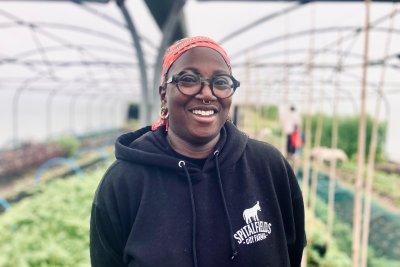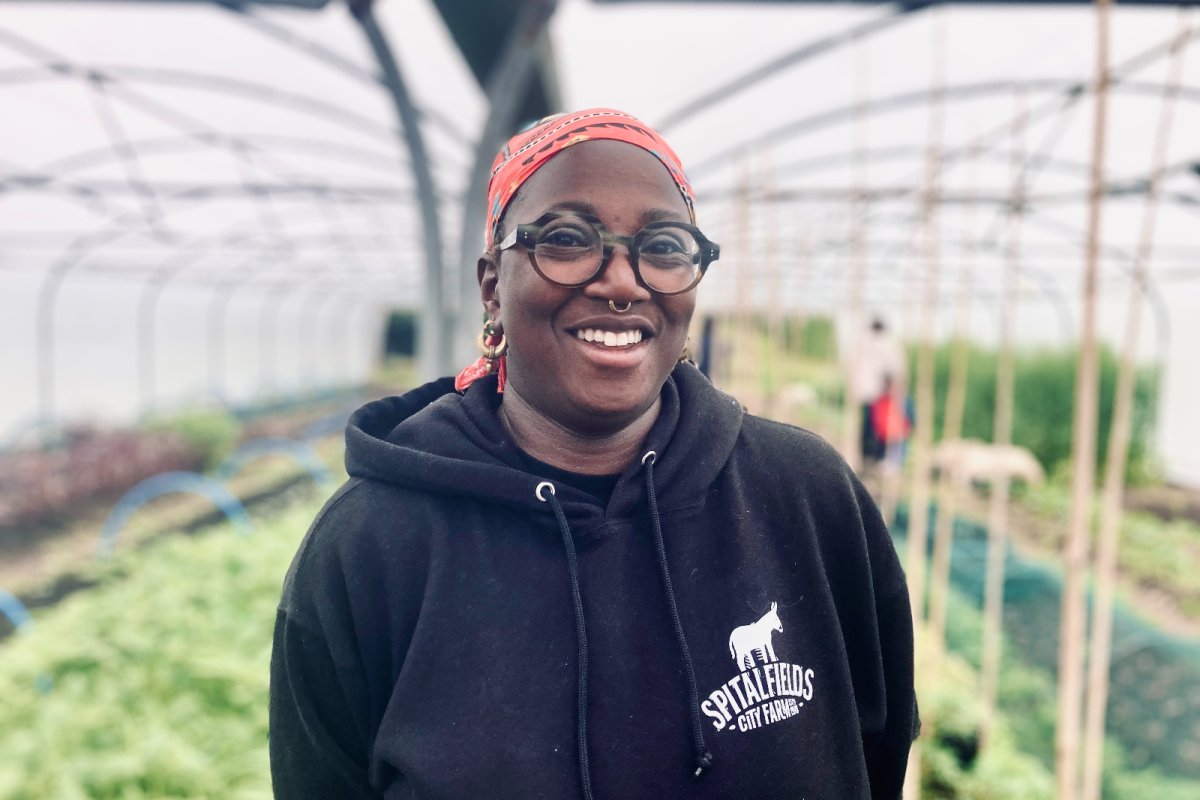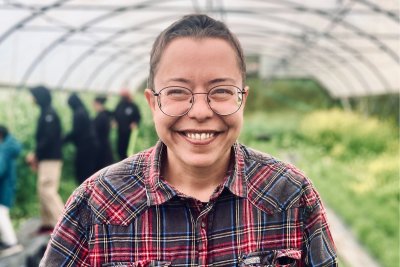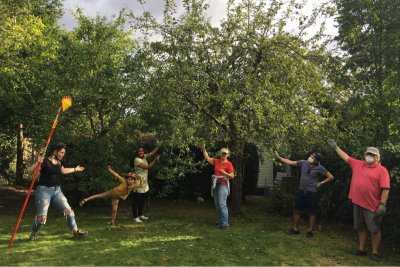 Folx Farm co-founder, outdoor educator and grower Rae. Copyright: Alexandra Rose
Folx Farm co-founder, outdoor educator and grower Rae. Copyright: Alexandra Rose

From Tower Hamlets to the heart of the East Sussex countryside – Bridging the Gap in action
Sustain's Bridging the Gap programme is about removing financial barriers, strengthening local food chains and reconnecting people with the land and each other. And when a group of East Londoners made their way to the buzzing Folx Farm it all came to life, explains Stef Lake, from Bridging the Gap partner Alexandra Rose Charity.
On a bright summer morning, a group of East Londoners made their way from Tower Hamlets to the buzzing biodiversity of an East Sussex farm. Families receiving Rose Vouchers, volunteers from the Teviot Centre Food Co-op, and staff from Alexandra Rose Charity and Leaders in Community came together for a special visit to Folx Farm, a small, community-rooted organic farm that’s fast becoming a vital link in the local food justice chain.
This visit was part of the Bridging the Gap programme, a pioneering initiative led by Sustain alongside Alexandra Rose Charity, Growing Communities and national partners. It’s an ambitious but necessary response to a broken food system - one where good food costs more, poor health is concentrated in low-income areas and those most affected by climate change are least able to access climate-friendly food.
The solution? Make organic and agroecological food genuinely affordable and work with trusted local hubs to get it to people who experience some of the highest barriers to purchasing organic produce.
From patch to plate
With one acre of polytunnels and greenhouses, acres of meadow and marshland and their own rain-fed reservoir, Folx Farm grows more than just produce. With vegetables, salad and herbs hand-tended by women and non-binary growers, their mission is as much about people as plants.
During the visit, Rae, one of the growers and farm co-founders (pictured), explained:
“We’ve gradually built those connections by visiting the Teviot Centre. Cheap food is not necessarily good food, and good food is expensive. We’re in the business of feeding people and feeding people well, and so we’re always trying to find ways we can do that.”
The visit began around a large wooden table in one of the polytunnels, one used specifically to grow food for the Teviot Centre Food Co-op. Guests were welcomed with hot lemon verbena tea brewed with fresh herbs and heard how Folx Farm listens directly to the food co-op community, growing culturally important crops like mustard greens, coriander, and purple amaranth by request.
Walking around the farm with Rae and Chrissy, the other Folx Farm co-founder, children ran along the rows of vegetables looking for ladybirds, while adults tasted sweet green peas and fragrant herbs like chervil. “Everyone’s into organic now,” said Shamima, a food co-op volunteer and Rose Voucher recipient. “We can taste the difference.”

Changing narratives
Back around the table, Steph, a project officer at Alexandra Rose Charity, said, “It’s such a misconception that people on low incomes just want junk food. When good food is affordable, that’s what people want to eat.”
This is echoed by the data. As outlined in Appetite for Organic, Alexandra Rose Charity’s recent report on the Tower Hamlets pilot, price is the biggest barrier to buying organic food. But once cost is addressed through a 45% discount and weekly Rose Vouchers (averaging £9.30 per family), shopping habits shift dramatically. Residents are replacing around £8 worth of non-organic produce with organic alternatives each week.
What’s more, families report feeling more confident about what they’re feeding their children. For some, the food co-op is the only place they trust to buy organic. “My child knows when I don’t get a cucumber from the [Teviot Centre] Food Coop,” one participant said, “she will only eat the food co-op cucumber!”
Systems change
The connection between Folx Farm and the Teviot Centre Food Co-op is a working example of a fairer food system rooted in mutual respect and shared values. The organic produce isn’t just affordable, it’s grown with the community in mind, tailored to their preferences and sold by familiar faces in a familiar place.
That trust is critical and has ripple effects. Families are trying new ingredients, cooking more meals from scratch, and even reducing food waste by shopping more intentionally. There’s also a renewed enthusiasm for seasonal eating, driven by a better understanding, rather than constraint.
A taste of the future
The day at Folx Farm ended with a potluck lunch bursting with colour and care. Homemade dishes from Teviot Estate residents using food co-op produce were served alongside a vibrant salad from the Folx Farm growers, decorated with edible flowers.
This is what Bridging the Gap is about: removing financial barriers, strengthening local food chains, and reconnecting people with the land and each other. It's a tangible example of how the right infrastructure and the right values can transform diets and connect communities with their food.
Alexandra Rose Charity’s mission is to give families access to fresh fruit & vegetables in their community. Read more about their work and their innovative Rose Vouchers.
Bridging the Gap is funded by the National Lottery Community Fund.
Bridging the Gap: Exploring ways to make organic food more accessible via farmer-focused supply chains.
Sustain
The Green House
244-254 Cambridge Heath Road
London E2 9DA
020 3559 6777
sustain@sustainweb.org
Sustain advocates food and agriculture policies and practices that enhance the health and welfare of people and animals, improve the working and living environment, promote equity and enrich society and culture.
© Sustain 2026
Registered charity (no. 1018643)
Data privacy & cookies
Icons by Icons8







